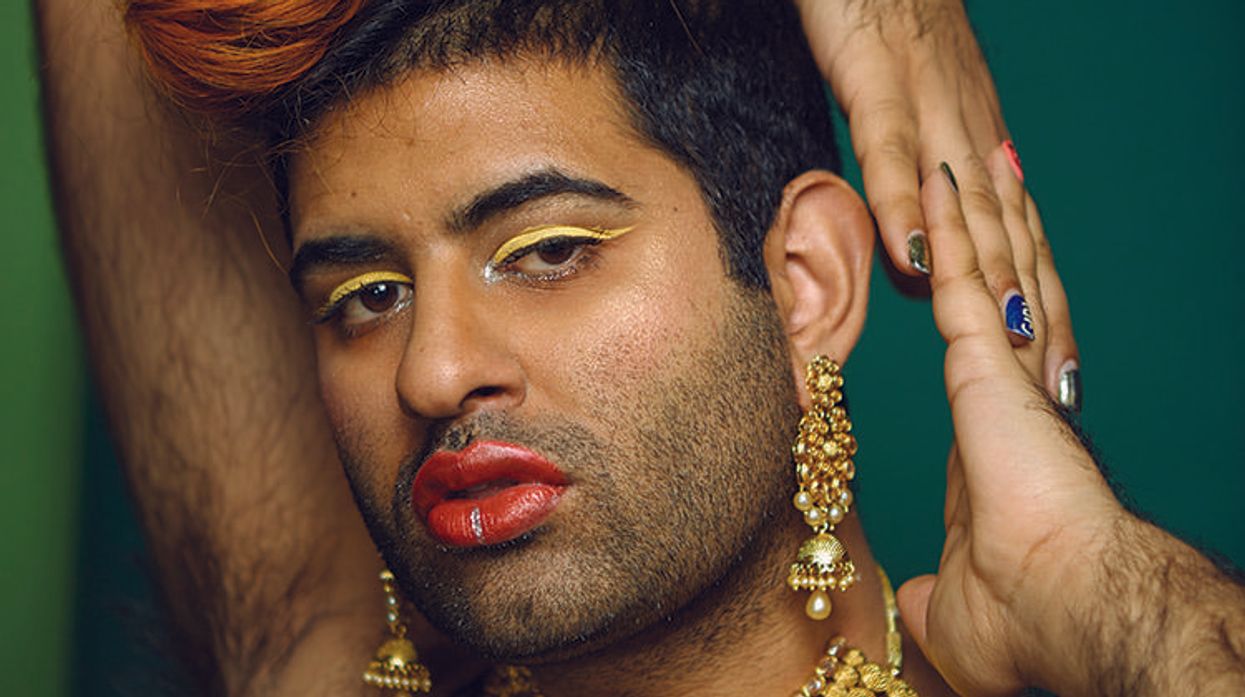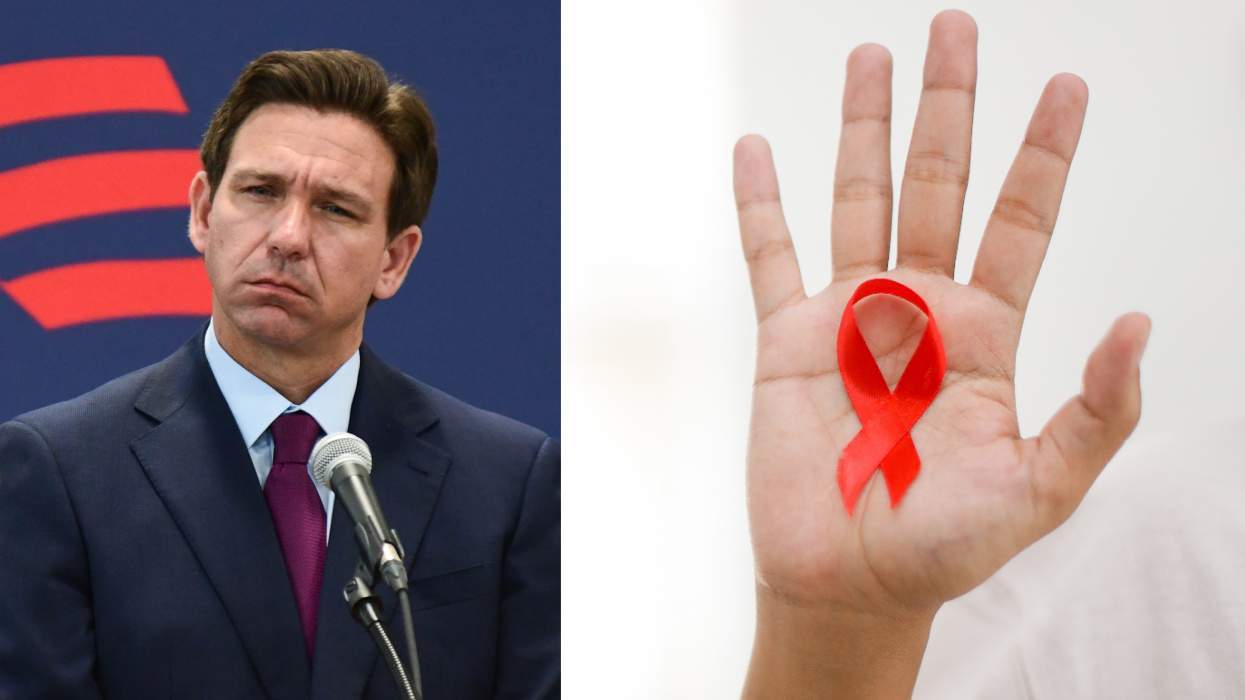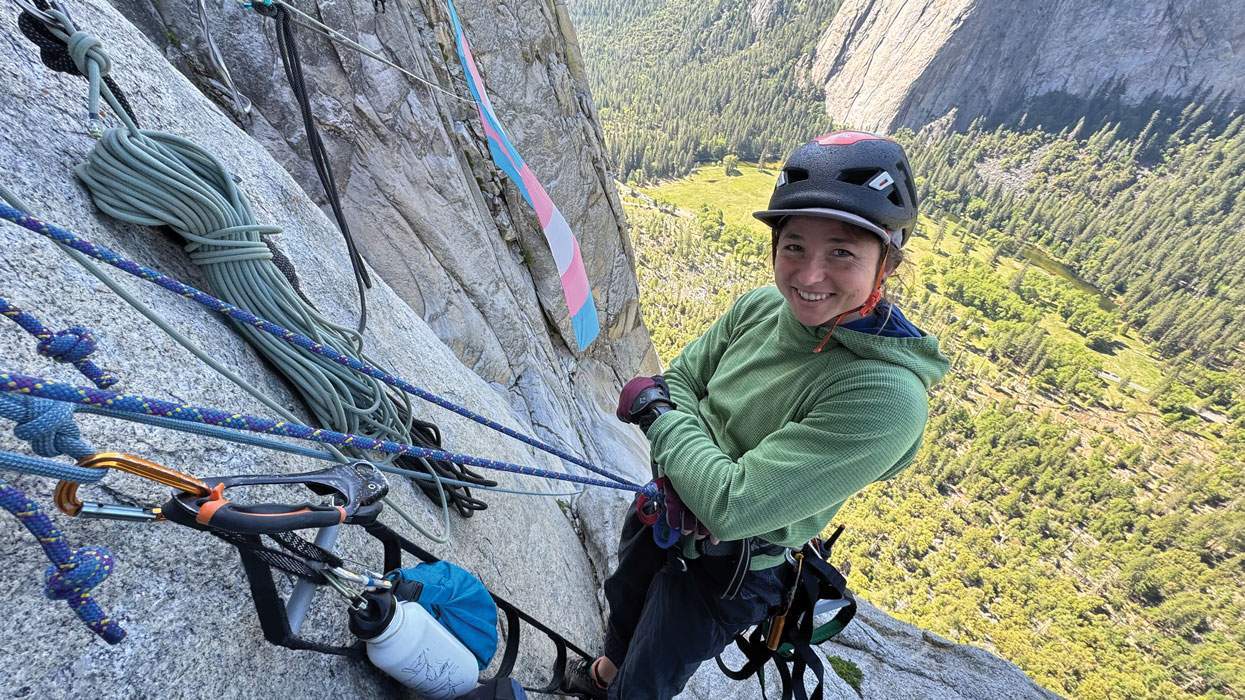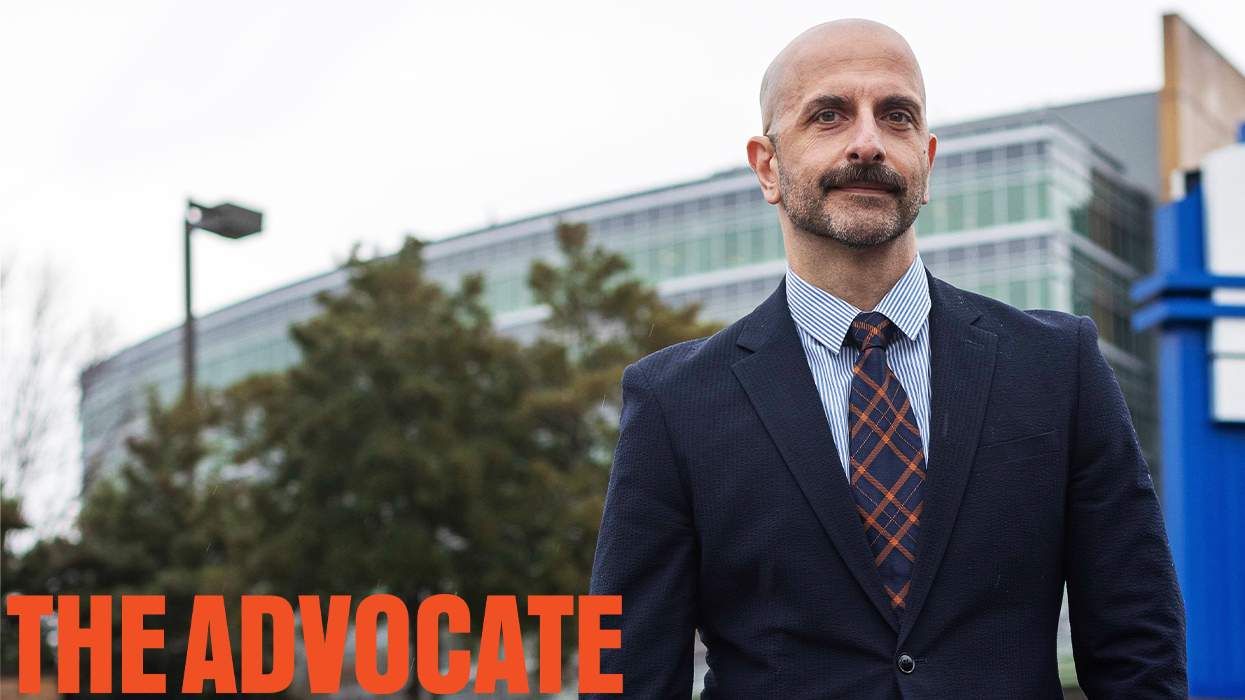The colorful patterns and layered textures of Alok Vaid-Menon's third fashion collection riff on traditional Indian designs, early Hollywood glamour, 1980s shoulder-padded excesses, stuffy Victorian-era collars, and sexy short-short hot pants--all filtered through their gloriously joyful femme fashion aesthetic.
Each item in their latest collaboration with New Delhi fashion designer Adrianne Keishing bears a name like "Biological," "Innate," or "Natural," reclaiming terms that have long been used to police the identities and expressions of those with nonconforming genders like that of the internationally renowned Indian-American writer and performance artist.
Vaid-Menon wears a slip-dress made famous via an Instagram post earlier this year, in which they wrote "The day after being called a tranny in this outfit I had a photo shoot. I saw this dress, still stained with the tint of their laughter, discarded on my living room floor like a fruit rind -- or an ex. it reeked of both fear & sweat, pungent, unforgiving. perhaps it was a whim (or death drive) but somehow I decided to bring it with me. touching it: I felt their loneliness. their shame. there is a magic to navigating the world in this body: I see things other people don't see -- so when the camera invited me in: I surrendered to the ritual & found myself smiling on the other side. reclamation is turning destruction into joy."
In 2017 the Texas-born-and-raised Vaid-Menon received a Live Works Performance Act Award (granted to just ten performance artists around the world) and released their poetry chapbook Femme In Public. Since then they've been touring a solo performance of the same name. This past Valentine's Day at the Invisible Dog Art Center in Brooklyn they unveiled Strangers are Potential Friends a series of site-specific performance pieces. Over the years, Vaid-Menon has been featured on HBO, MTV, The Guardian, BBC, CNN, and The New York Times and has presented their work in hundreds of venues in more than 40 countries.
In an exclusive interview with The Advocate, Vaid-Menon talks about the ableism of our beauty standards, expanding our notions of femininity, changing the world of fashion, the "culture of violence" that polices conformity, and the historical revisionism and cultural racism they experience as an Indian-American.
You've talked about how we need to see 'feminine' as potentially 'gender neutral.' Can you tell me more about why masculine always ends up being some kind of neutral while femininity isn't? Do you see your fashion line addressing that?
In our patriarchal society we are taught that the default/universal body is masculine and that femininity is an addition to this form. This means masculinity is unmarked whereas femininity is seen as an addition or something extra to it. This dynamic manifests in the gender-neutral space as well. So often gender neutrality just defaults into masculine form and aesthetics. This is why many gender-neutral fashion campaigns just feature shorts, suits, and maybe rompers - but rarely dresses or skirts. I believe that femininity, masculinity, and gender neutrality should mean what we want them to be. We should be able to choose their meanings. I create fashion to challenge how people have been taught to see dissonance, but actually I believe there is harmony. My body is not "male," and the garments I wear are not "female," I am just me!
What's the biggest difference between your third fashion line and the two previous ones?
I think all of them are building off from one another. With each iteration I was giving myself more permission to imagine more expansively. With the latest collection I was thinking through how so many times people tell me that if I want to look more "convincing" or "believable" then I should just "tone it down." The idea is that "dressing up" is about artifice. I wanted to actually challenge that and say for some people wearing a wig, a full face of makeup, and a gown is actually about feeling natural. Rather than being a fixed or static thing, we should be able to say what is natural to us.
You've said winter is the hardest time for you to feel like yourself. Do you have plans to do a winter line?
Just because often times the winter coats that are available that are actually warm tend to be so drab! It's difficult to express myself in gray all covered up. Yes, one day I hope to design more -- super warm -- and festive winter gear!
How do you handle sizes in your fashion line?
Right now the pieces that I design are just made for me. I don't have the infrastructure (yet) to distribute them to others - though I hope one day that I can.
I read your piece in Paper and when you were talking about hearing your female relatives worry about looking too masculine. I thought about my own mother. She was recently talking about how an elementary school shrink once told her he was certain I would be better adjusted if I'd just wear a dress once in a while. My mom hates dresses and makeup and almost never wears either, and she internalized this as a failure of her own femininity, her own womanhood. Like if that's what it takes to be a girl, where does that leave her? How do we combat this?
We have to proliferate so many images, ideas, styles, modes of being a woman, a man, nonbinary such that the norms that we associate with them become irrelevant. Rather than policing the boundaries of gender we must remain open to their constant expansion and undoing. This is why nonbinary and gender nonconforming people calling for a world without the gender binary will actually help everyone. There are many manhoods, womanhoods, nonbinary ways of being. We have to create more space for people to determine their own meaning and expressions.
You've said that a lot of what we call beauty is actually ableism. Can you talk about what you mean by that?
Beauty has always been about power. So often what we call "beautiful" is just able-bodiedness, whiteness, thinness, and gender conformity. I think this is a terribly reductive approach to beauty. Everyone is beautiful and we have to create a world that recognizes that by challenging systems which rank certain bodies are more worthy than others.
Tell me how the beauty industry steals the creativity and genius of women of color, gender nonconforming people, or disabled people, but only for cisgender white, thin able-bodied consumers.
So often we are the mood boards and never the models. We are deemed "inspirational," and the ways that we inhabit and navigate the world is decontextualized from our everyday struggles. It's about palatability. People feel like we are "too much" or "never enough," which is where discrimination lives, especially in the fashion [and] beauty world.
People like you, who so clearly aren't conforming to expectations about appearances are often targeted for violence, and sometimes blamed for that violence. Why is it that some people don't just think all people deserve to not be victimized by violence regardless of how they look or what they wear or what color their skin is? Do they really not think all humans deserve safety regardless of whether they conform or not?
This is how a culture of violence works. We are recruited into it. We are told that if we look and/or act a certain way then we will be safe. We are punished into submission and policed away from thinking otherwise. There may be power and stability that comes from that silence, but also great suffering. It takes so much work to unlearn this and practice another way to relate to ourselves and one another. I think art can be particularly helpful with that.
I know you've said before that people sometimes assume your family isn't accepting of you or "you'd be killed if you didn't live in the United States." That hasn't been your experience though, right? Can we talk about why there's this assumption that Indians are more conservative when it comes to gender and sexuality -- when history begs to differ?
Right. It's historical revisionism and cultural racism. We are taught that immigrants and racialized people are somehow more "conservative," and thereby more patriarchal, homophobic, and transphobic. So much of the way that US imperialism works is by dismissing everyone and everywhere else as regressive or backwards. The truth is that there is homophobia and transphobia everywhere and in each place it takes a unique form. Also, what often gets lost in this declaration is how gender fluidity and queerness were and continue to be celebrated by many indigenous peoples across the world and how colonization institutionalized the gender binary in the first place.
Like 30,000 other people, I loved this Instagram post and am awed by your ability to not only remain fierce in the face of such hatred but to find ways to become empowered by that. I'm sure everyone asks this, and you'd be rich if you could answer: how can I bring more of that attitude into my own life?
Hehe I guess it's the magic that comes from being connected to the creative process. I believe that everyone is an artist it's just that some people are given resources and permission to express their artistry. What art -- and my performance practice in particular -- allows me to do is to process my pain, remove it from my body, confront it, and transform it. My art practice has allowed me to see how the only constant is impermanence: everything is in flux. This helps me believe in the infinite transformation of myself and other people.
Can you tell me a little about Femme in Public versus Strangers Are Potential Friends?
Femme in Public is the solo show I've been touring from the past few years based off of my poetry chapbook Femme in Public. Strangers are Potential Friends is a series of site-specific performance pieces I did for Valentine's Day at the Invisible Dog Art Center in Brooklyn. With those pieces I was trying to creatively challenge loneliness and celebrate alternative forms of intimacy that get neglected with our society's focus on romantic love.
What is the book project you're working on?
I just finished a book on why we should move beyond the gender binary. It comes out next year!















